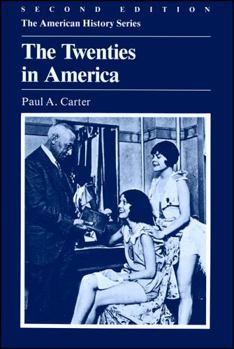20s in America 2e
Select Format
Select Condition 
Book Overview
A principal theme of the 1920s was "paradox," and Professor Carter explains the tensions that existed between city and country, progress and nostalgia for the past, progressive attitudes and the persistence of bigotry. Carter also provides incisive reevaluations of some archetypal figures of the era, such as Coolidge, Lindbergh, and Hemingway, and suggests new ways of considering events and developments such as jazz, popular sports, the Scopes...
Format:Paperback
Language:English
ISBN:0882957171
ISBN13:9780882957173
Release Date:January 1975
Publisher:Wiley-Blackwell
Length:142 Pages
Weight:0.45 lbs.
Dimensions:0.3" x 5.0" x 8.0"
Grade Range:Grades 11 to 12
Customer Reviews
0 rating





